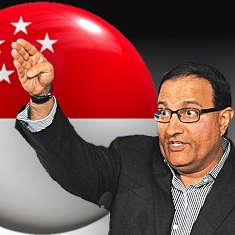Singapore Online Gambling Ban Could Face Legal Challenges

At the end of last year, concerns were raised that Singapore would soon seek to prohibit all types of remote gambling after its Second Minister for Home Affairs (pictured) spoke strongly in favour of introducing anti-internet gambling policies. However, the Singapore government could open itself up to all sorts of legal challenges from some of the biggest online betting operators in the world if it attempts to ban them in a discriminatory way from the country’s unregulated remote gambling market, a gambling law expert has warned.
Singapore gambling market
The Southeast Asian country of Singapore introduced land-based casinos in 2010, and has since grown to become the third largest gambling market in the world, behind Macau and Las Vegas. The island state with a population of just 5.3 million people currently boasts two integrated casino resorts, namely The Marina Bay Sands and the Genting Group’s Resorts World Sentosa, which last year generated a combined $6.077 billion in revenues, up 3.8% from the $5.85 billion taken in 2012.
In addition, Singapore’s unregulated online gambling market is estimated to have generated a further $375 million in annual revenues, most of which ends up in the pockets of offshore gambling operators. However, the Singapore government has now signaled its intention to clamp down on remote gambling and place heavy restrictions on online betting in the country.
Remote gambling a divisive issue
Ironically, the global online gambling industry represents the single most attractive growth area for potential operators, with the $35 billion a year industry recording a 9% growth rate in 2013, more than five times higher than that of land-based gambling venues.
Nevertheless, legalizing online gambling has become a divisive subject in many countries across the globe, with those taking an opposite stance highlighting the ease in which players can access websites compared to controlled land-based casinos, the addictive nature of online games, as well as the risk online gambling sites could be used for illegal activities, such as money laundering.
Outlining his country’s intention to restrict remote gambling in Singapore, last year Mr Iswaran from the Ministry of Home Affairs, stated: “”We will introduce new laws to give our law enforcement agencies the powers to act against facilitators, intermediaries and providers of remote gambling services. We will introduce measures to block access to gambling websites, block payments to remote gambling operators and prohibit advertisements promoting remote gambling.”
Naturally, if the Singapore government does decide to act upon the underlying concerns expressed in a recently issued public consultation paper, this would come as very bad news for the online poker professionals in the country who view the game as a skillful exercise in risk management, rather than simply another casino gambling game. Many of these players would subsequently find themselves facing a similar situation to that imposed on US players in 2011, when the Department of Justice shut down the main offshore online poker operators as part of its Black Friday operation.
Singapore could face legal challenges
It is not known precisely how the Singapore government would seek to restrict online gambling, although one idea mentioned by Christian Kalb of CK Consulting, suggests discriminating against the online betting companies based on size. As the Singapore Law Watch report, states: “You do not need to target a small bookmaker based in Central America. You choose the targets, and it is not 1,000 companies.”
Nevertheless, gambling consultant Bryan Tan believes such an approach would be ill-advised and could result in a series of legal challenges being issued by the bigger operators. The law expert for Pinsent Masons MPillay, added:
“The Singapore Government will probably take inspiration from different models to control remote gambling – the task may be an uphill one considering how connected the country is and the open nature of its payments infrastructure.”
Even if Singapore seeks to legalize remote gambling via a licence issued exclusively to a single government owned operator, it will still confront similar challenges currently faced by US states where unlicensed websites continue to operate within the “US friendly poker sites” market. In other words, in order to be effective, Singapore would have to be able to close all other unlicensed operators, a technologically overwhelming task even if it was possible.
In its favour, however, is the fact Singapore can at least study gambling restrictions implemented by other countries before taking any drastic measures. As the Ministry of Home Affairs then explains:
“We will study carefully in detail whether to provide an exemption in Singapore and if so, the nature of provisions for a tightly controlled exemption regime, with constraints on the type of operator and the imposition of stringent social safeguards. We will study the experiences of other jurisdictions in this regard.”










